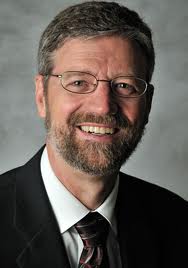By Ervin Stutzman
We live in a world of hyper partisanship. Statisticians indicate that the United States Congress votes more consistently along party lines now than at any other time since the Civil War. Yet I am not convinced that most of the good ideas reside on one side or another of the congressional aisle.
For one thing, partisan politicians generally compare the best of their own accomplishments or ideas with the worst of their opponents’. And they work hard to please the partisan voter who elected them, often because of strong convictions regarding the issues at hand.
Still, I’m confident that if leaders from different political parties would combine their energy and intellectual capacity to govern this country in a more cooperative manner, the average citizen would be far better off. Even the thorniest of issues like the broken immigration system might be solved in this way. Meanwhile, a lot of people suffer.
Unfortunately, our church too often reflects the nation’s ideological divides. This poses a leadership challenge; pastors have told me that national election season is one of the most challenging times for them to preach. They feel like they’re walking a tightrope, fearing they will unduly offend their parishioners’ political sensibilities.
One of the reasons why the current church debate on human sexuality is so divisive, particularly regarding same-sex marriage, is because it is a political “hot button” in our nation. Rapid changes on the societal front present significant challenges for the church. However, in the church, we must be vigilant lest any social issue, even same-sex marriage, distract our attention from a larger question: How will we live together as a community of God’s people committed to God’s mission in the world? Answering that question can help to bring clarity to the pastoral and missional concerns which help us carry out our ministry to people in any kind of social situation.
We know from long experience that thoughtful, sincere, respectable and Spirit-filled people may disagree on social and political issues. At the moment, the ones getting the most attention on the national scene are abortion, gun control, immigration laws, health care, the scope and role of the federal government, the conflict in Israel/Palestine, and same-sex marriage. Given the way that many of us participate in the national political process, it is both predictable and somewhat shameful that we import these differences into the heart of our church.
I confess that I cannot imagine Jesus as a fiery advocate for the political approach on either side of many of these social issues. I believe he would be more likely to confront the rhetorical tone and many of the presuppositions and actions of all the parties in many of these public debates.
It’s not that we shouldn’t have spirited debates, even heated ones. I wouldn’t trade the democratic process in our nation’s capital for that of any other nation in the world. But the hyper partisan environment diminishes its effectiveness. Particularly in such polarized times, no political party deserves our highest loyalty, which rightly belongs to God and to God’s kingdom community, the church.
I pray with hope that we can find a third way in Mennonite Church USA. We need not be divided by a party spirit, so that one side or the other must win. Rather, we must seek for shared values and norms for Christian living that benefit our whole community. As Anabaptists, we must find our most pressing common cause in our covenant commitment to follow Jesus. That’s why the Purposeful Plan for Mennonite Church USA asserts that as a church, we will emphasize common vision rather than divisive issues. (p. 15, February 2014).
I’ve worked for years on leadership teams with people who have very different gifting, personalities and motivations. Some are introverts, others are extroverts. Some are cautious, others readily take risks. Some shun noisy crowds; others love interaction with large groups. Sometimes we have very different convictions about the best way to approach a particular social situation. You get the picture.
At times those differences mean that we disagree strongly on the way to proceed on a certain project, or how to go about making a decision. Although the process of cooperation may at times yield a grudging compromise, it can also result in an energizing synergy. Compromise implies giving up something for the sake of the other, resulting in less than what each would have hoped. Synergy implies something better and greater than each would have hoped for. It’s a win-win situation for all parties who have come together to form an alliance.
On my most hopeful days as executive director of Mennonite Church USA, I dream of a synergy between conservatives and progressives in the church. I know from experience how much both perspectives have to offer in fulfilling God’s mission in the world. I do not expect that a third way will bring all to agreement on divisive topics. But I live with the hope that we can find the synergy to write a covenant that captures our heartfelt commitment to be a grace-filled and loving community of God’s people, committed to God’s mission in the world. That’s what I mean when I speak of a “third way” in the midst of our current debate.


